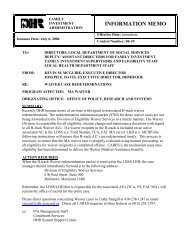Field Manual for 2013-2014 - University of Maryland School of ...
Field Manual for 2013-2014 - University of Maryland School of ...
Field Manual for 2013-2014 - University of Maryland School of ...
Create successful ePaper yourself
Turn your PDF publications into a flip-book with our unique Google optimized e-Paper software.
appropriate, and culturally sensitive boundaries that govern such physical contact.<br />
1.11 Sexual Harassment<br />
Social workers should not sexually harass clients. Sexual harassment includes sexual advances, sexual<br />
solicitation, requests <strong>for</strong> sexual favors, and other verbal or physical conduct <strong>of</strong> a sexual nature.<br />
1.12 Derogatory Language<br />
Social workers should not use derogatory language in their written or verbal communications to or<br />
about clients. Social workers should use accurate and respectful language in all communications to and<br />
about clients.<br />
1.13 Payment <strong>for</strong> Services<br />
(a) When setting fees, social workers should ensure that the fees are fair, reasonable, and<br />
commensurate with the services per<strong>for</strong>med. Consideration should be given to clients’ ability to pay.<br />
(b) Social workers should avoid accepting goods or services from clients as payment <strong>for</strong> pr<strong>of</strong>essional<br />
services. Bartering arrangements, particularly involving services, create the potential <strong>for</strong> conflicts <strong>of</strong><br />
interest, exploitation, and inappropriate boundaries in social workers’ relationships with clients. Social<br />
workers should explore and may participate in bartering only in very limited circumstances when it can<br />
be demonstrated that such arrangements are an accepted practice among pr<strong>of</strong>essionals in the local<br />
community, considered to be essential <strong>for</strong> the provision <strong>of</strong> services, negotiated without coercion, and<br />
entered into at the client’s initiative and with the client’s in<strong>for</strong>med consent. Social workers who accept<br />
goods or services from clients as payment <strong>for</strong> pr<strong>of</strong>essional services assume the full burden <strong>of</strong><br />
demonstrating that this arrangement will not be detrimental to the client or the pr<strong>of</strong>essional<br />
relationship.<br />
(c) Social workers should not solicit a private fee or other remuneration <strong>for</strong> providing services to clients<br />
who are entitled to such available services through the social workers’ employer or agency.<br />
1.14 Clients Who Lack Decision Making Capacity<br />
When social workers act on behalf <strong>of</strong> clients who lack the capacity to make in<strong>for</strong>med decisions, social<br />
workers should take reasonable steps to safeguard the interests and rights <strong>of</strong> those clients.<br />
1.15 Interruption <strong>of</strong> Services<br />
Social workers should make reasonable ef<strong>for</strong>ts to ensure continuity <strong>of</strong> services in the event that<br />
services are interrupted by factors such as unavailability, relocation, illness, disability, or death.<br />
1.16 Termination <strong>of</strong> Services<br />
(a) Social workers should terminate services to clients and pr<strong>of</strong>essional relationships with them when<br />
such services and relationships are no longer required or no longer serve the clients’ needs or interests.<br />
(b) Social workers should take reasonable steps to avoid abandoning clients who are still in need <strong>of</strong><br />
services. Social workers should withdraw services precipitously only under unusual circumstances,<br />
giving careful consideration to all factors in the situation and taking care to minimize possible adverse<br />
effects. Social workers should assist in making appropriate arrangements <strong>for</strong> continuation <strong>of</strong> services<br />
when necessary.<br />
(c) Social workers in fee <strong>for</strong> service settings may terminate services to clients who are not paying an<br />
overdue balance if the financial contractual arrangements have been made clear to the client, if the<br />
client does not pose an imminent danger to self or others, and if the clinical and other consequences <strong>of</strong><br />
34

















